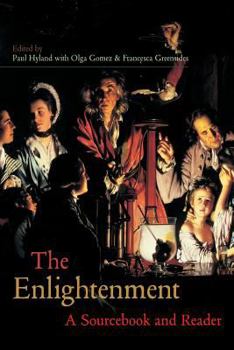The Enlightenment: A Sourcebook and Reader
(Part of the Routledge Readers in History Series)
Select Format
Select Condition 
Book Overview
The Enlightenment brings together the work of major Enlightenment thinkers such as Hobbes, Rousseau, Diderot and Kant, to illustrate the full importance and achievements of this period in history. Extracts are gathered thematically into sections on such aspects of the Enlightenment as:
political theory religion and belief art and nature.All essays are introduced, and a final section on 'critical reflections' provides a selection of modern critical opinions on the period by writers including Foucault, Habermas, and Lyotard.
Containing illustrations from the work of artists such as Hogarth and Gainsborough, a chronology of the Enlightenment, and a detailed bibliography, The Enlightenment is a rich source of information and inspiration for all those studying this great period of change.Format:Paperback
Language:English
ISBN:0415204496
ISBN13:9780415204491
Release Date:February 2003
Publisher:Routledge
Length:488 Pages
Weight:1.90 lbs.
Dimensions:1.2" x 6.1" x 9.2"
Customer Reviews
1 rating
Prepare to be Enlightened...
Published by Thriftbooks.com User , 20 years ago
While I might quibble a bit with the chronological boundaries set by the editors of this text, it nonetheless incorporates the majority of the Enlightenment period in the selection of writings. The Enlightenment is primarily the post-Renaissance philosophical period around the eighteenth century, where reason and individualism in the various intellectual disciplines surpassed tradition as primary factors. Key figures in the Enlightenment strand of philosophy include Newton, Locke, Leibniz, Voltaire, Hume, Montesquieu, Rousseau, Diderot, Pope, Gibbon, Adam Smith, Bentham and Kant. Various artistic, literary, philosophical, and political movements that began in the Enlightenment are still primary factors in the world today. For example, the economic and political frameworks of the American Revolution and the French Revolution came out of this movement. Scientific and mathematical principles established during this period still remain powerful methodological tools in current practice. Editors Paul Hyland, Olga Gomez and Francesca Greensides each bring a background of liberal arts, history and cultural studies to bear the task of developing this superb collection of readings and essays on the Enlightenment. The texts themselves come from as original of sources as were available -- the editors did not try to 'clean up' the language or standardise too much, but did do editorial changes to reduce awkwardness in punctuation, capitalisation and such. Most of these selections come from authoritative eighteenth century editions or translations. Each section of sources is tied to a particular subject or theme; each section is introduced by a brief essay discussing the importance of the subject or theme to the overall context of the Enlightenment. For example, the very first subject section is on Human Nature -- given the importance of the rise of individualism as a key concept regarding human nature for the Enlightenment mindset, this is a good place to start. Alexander Pope is quoted as an Enlightenment champion for saying 'the proper study of mankind is man', in other words, the movement was away from theological ideas concerned more with a distance and unchanging/immutable God and more toward the human condition. There are thirteen sections of sources, which include the following topics: Human nature; the search for knowledge; religion and belief; the natural world; science and invention; political rights and responsibilities; civil society; moral principles; gender and society; art, architecture and nature; Europeans and the wider world; radicalism and revolution; and a few autobiographical pieces (Rousseau, Franklin, and Madame de Roland). Within each of these sections are a selection of sources from the major writers, artists and other figures of the period, sources that had the greatest impact -- for example, under the topic of political rights and responsibilities is included passages from Locke and Montesquieu, as well as sources from





